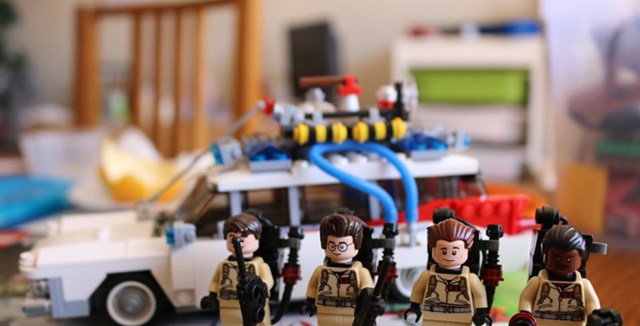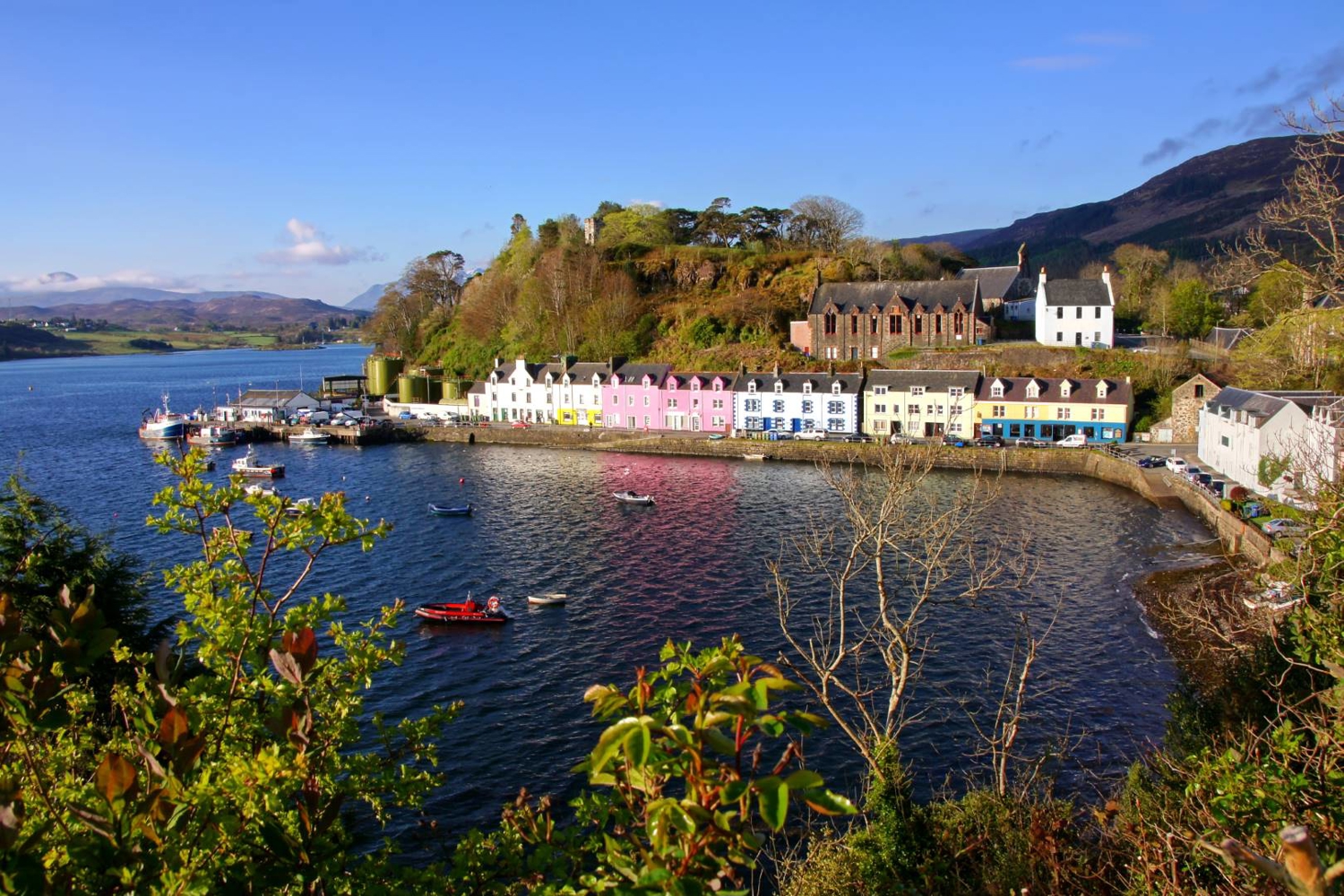Tim is our Training and Marketing Officer. He has held a number of roles as part of #TeamKSBScot and was one of the first in Scotland to be certified as Carbon Literate through Carbon Literacy for Communities Training. He now develops and delivers Climate Emergency Training to a variety of clients. In this blog he communicates the benefits of climate action for people and planet with a humorous look a some of his favourite films…
What parallels can two 1980’s ghostbusting films possibly have with showing us a way forwards after the United Nations Climate Change Conference that took place in Glasgow? I’d like to share my thoughts with you.
I can identify at least three events that happened during the 1980’s that had a big impact on me at the time. And these things still have an influence on my life today, albeit in very different ways.
First, a film called Ghostbusters* was released in 1984. I was too young to see the film on release, but I remember seeing all the promotion and the big crowds outside the local cinema. The film provided hours of playground games. The toys were everywhere. And I even bought the theme tune on vinyl!
Second, Ghostbusters 2 was released in 1989, following the success of the first film. I watched this film upon its television release, and as well as being amazed at the special effects, I drank in the storyline that negative emotions of people living in big cities could have a wider negative impact.
And third, I noticed that concern on climate change was burgeoning. I listened to the predicted impacts such as sea level rise. I also worried that snow, one of my favourite childhood things might happen less. And I wondered why we weren’t doing more to head off the crisis.
Fast forward a few decades and I have well-used copies of the Ghostbusters films and a stack of Ghostbusters videogames. I’m even more obsessed with snow. And study of climate change impacts and action forms a big part of my work and personal life.
So, what parallels are there between these two 80’s films and future action on climate change? I invite you to read on…
Cats and dogs living together
After a series of dialogue that has become famous in 80’s film history, the Ghostbusters finally convince the Mayor of New York City that they can stop the spirit world from invading ours.
How do they do it? They mention all the scary things that will happen with no action. Now infamous lines about cats and dogs living together are uttered. And saving the lives of millions of registered voters is key amongst the reasoning used by Ghostbuster Peter Venkman.
The mayor sees no other alternative than to support the ghostbusters. Which he does with a motorcade of police vehicles (yes, it would have been better to use a lower carbon method of transport) to get them to where they need to be in the city quickly.
But in the end, it’s the four Ghostbusters Vs the supernatural villain - Gozer the Destroyer. And our heroes triumph through a last-ditch effort of crossing the streams of their proton packs – a dangerous approach that could have ended life on earth had it gone wrong. But they had no alternative. It had got that desperate.
You could easily argue that things are pretty desperate with climate change too. Only we’ve not got four proton-pack toting, boiler-suit wearing, ghostbusters to save the day.

Image Credit: "Ecto1!" by Tama Leaver is licensed under CC BY 2.0
A decade of synth music and big hair
Ghostbusters came out in 1984 and the sequel in 1989, amongst a craze of synth music and some ‘interesting’ hairstyle choices.
Around the same time, we saw growing concern about the human activities releasing greenhouse gases, that could change our climate and cause severe impacts.
Indeed, between the two films, the Intergovernmental Panel on Climate Change (IPCC) was created. In 1988 the United Nations formally endorsed the creation of IPCC citing the fact that:
“[c]ertain human activities could change global climate patterns, threatening present and future generations with potentially severe economic and social consequences”, and that “[c]ontinued growth in atmospheric concentrations of ‘greenhouse’ gases could produce global warming with an eventual rise in sea levels, the effects of which could be disastrous for mankind if timely steps are not taken at all levels”.
Climate science has quickly advanced since then, and so have the levels of concern and certainty about human-induced changes and impacts to our climate.
But here we are in 2022 and we’ve not yet reached the pledges required to tackle climate change at an international level, let alone policies or actions.
There’s a lot of chat of how we need governments to take the lead and that we can’t do anything without them. And there are conversations going on across the world - just like that in the Mayor's office in Ghostbusters. And people are waking up to scary impacts – this time about climate change, not the spirit world. And people are realising that we have to take action.
Did the ‘chats’ at the United Nations Climate Change Conference in Glasgow go far enough and fast enough?
No. They didn’t.
But at least we’re facing in the right direction of travel. We know what the issues we need to tackle are – such as fossil fuel use, deforestation and providing finance to mitigate and adapt to climate change. And various countries are making pledges and agreements to move things forwards.
Power to the people
So, what needs to happen next? Sure, we need countries to come back to the next United Nations Climate Change Conference with more ambitious climate action pledges.
But the other thing we need is us.
In Ghostbusters 2, it’s again four mere mortals (some would say five if you count Louis Tully) against the wrath of the spirit world – this time it’s a seriously bad tempered dude called Vigo who originally lived in the 1600’s.
Why’s Vigo appeared on the scene? The Ghostbusters have researched it and are sure it’s due to the negative energy and mean actions from people in New York conjuring up a river of negatively charged slime under the city that’s feeding Vigo. It will make sense if you watch the film – honest!
So, what are the Ghostbusters to do, with one seriously mean-spirited villain having his evil game boosted by the actions of a whole city of people?
They use positive people-power of course.
They spray the Statue of Liberty with the slime.
They broadcast a rocking song from speakers hanging off the statue.
And guess what? People start cheering and singing along, creating positive energy.
The slime becomes positively charged, and with an ingenious radio-controlled setup our heroes find they can march the Statue of Liberty to confront Vigo.
Again, there’s a full police motorcade. And the people of New York are fully on board, cheering our heroes.
They enter the building by abseiling through the skylight and confront Vigo.
Unfortunately, it doesn’t go too well. Vigo pins all the Ghostbusters down with his ghoulish powers.
But when it looks like the game is up for our eponymous heroes, it’s the singing of the people gathered together outside the building that causes Vigo to release his hold on the stricken Ghostbusters and for them to turn the tables and to send Vigo packing.
Positive energy, eh? Who would have thought it could be so powerful?
The fight against Vigo shows how the support of many people together, taking positive actions can tackle what seems like an utterly hopeless cause.
And it makes sense that people were involved in solving a problem they’d caused in the first place.

Image Credit: "NY Statue of Liberty" by Celso Flores is licensed under CC BY 2.0
But as much as it would be great to watch we’re probably not going to see the Statue of Liberty taking a walk any time soon to kick climate change into touch, however loud we cheer.
Practical actions for people
So, what can we do? Well, the principle of positive people power still holds very true. Every one of us can make a difference. Here’s how:
- Address ‘big ticket’ items. This could involve reducing or removing high carbon activities such as flights.
- Address everyday behaviours that add up to a big impact.
- Can you work remotely? Or swap petrol/diesel car trips for other modes of transport e.g. rail, cycling, walking or electric vehicles? If you have to drive think about car-sharing or fuel-efficient driving.
- With heating and household appliances, if you don’t need it on or turned up - switch it off or turn it down. Investigate support to improve the energy efficiency of your home through insulation, and more efficient windows etc. And find what DIY measures you can take yourself. See if you could install renewable energy. And investigate switching to a renewable energy supplier.
- Swap from red meat towards locally sourced plant-based food and avoid unnecessary packaging where you can. Try growing your own food and cut down on food waste.
- Reduce the amount of stuff you buy. Focus on reusing and repairing what you have and borrowing what you don’t. Recycle stuff at the end of its useful life. If you have to buy something new, try to make sure it’s sustainably produced and will last well.
- Make changes that have a strong legacy. This action may have an initial cost, such as insulation of buildings. Over time your investment could be returned. Investigate grants that could support you.
- Make sure your investments, debts and household suppliers are climate friendly. This includes things like pensions, mortgages, bank accounts and other household suppliers.
- Take actions that influence others around you. Our collective impact is much larger than what we can achieve as individuals. Show leadership at work and work with others in your community. Tell our leaders what you think needs to happen.
- Understand more about climate change and your carbon footprint – it’s only by understanding which of our activities produce the most greenhouse gas emissions that we can make the most effective changes.
Rebooting the formula
Remember how the Ghostbusters used all manner of scary things to convince Mayor Quimby he needed to let them save the world from the ghostly Gozer?
One plot for the sequel to the original Ghostbusters even had them failing in their Gozer mission and the ghouls taking over the planet – this was eventually used in a Ghostbusters video game. Again, it’s a pretty scary outcome.
But what type of future do we have to ‘look forward to’ with climate change? Is it equally scary and is it best communicated with scary stories of what will happen if we don’t take action?
We do know we can limit the most catastrophic impacts of climate change if we act strongly now to reduce greenhouse gas emissions.
But is that it? Is the future really that bleak?
No.
And here’s why - because for every action to tackle climate change there are other benefits that will help to create a better world for people and nature:
- Less air pollution and noise due to less car and plane fumes.
- Better public transport and active travel infrastructure and neighborhoods where services are easily reachable by walking or wheeling.
- Improved mental and physical health due to more active travel and a diet rich in fresh local fruit and vegetables.
- More green spaces and improved biodiversity as we create spaces and places that allow for more intense rainfall and flooding around watercourses, plus shade for increased heat.
- Opportunities for green skills and jobs.
- Less fuel poverty due to better insulated homes, more efficient use of energy and household renewable energy.
- Access to high-quality second-hand stuff and better repair skills.
Wouldn’t that be a fantastic world to live in? Something to look forward to. Something to talk about. Something to work towards. I’m certainly looking forward to that world and am working to help play my part in making it a reality.

Image Credit: Adaptation Scotland Climate Ready Places, Contains public sector information licensed under the Open Government License v3.0
I'm hopeful that when countries revisit their climate change pledges they’ll be more ambitious.
And I’m convinced that actions we take as people can make a positive difference to tackling climate change and building a greener, healthier world for people and nature.
I’m also looking forward to watching the new Ghostbusters film – and yes I know I said I’d only talk about two films in the introduction…This is a reboot of the franchise, where a group of youngsters find out about a repeated threat from Gozer and take on the mantle of our 80’s spookbusting icons to save the world.
But our youthful heroes can’t do it all on their own. They still need the old guard of Ghostbusters to step up and do their bit too, and help them secure a positive future. This is poignant to me as right now young people are asking for help to tackle climate change.
So, what parallels do all these ghostbusting films have with showing us a way forwards after the United Nations Climate Change Conference? Here’s my take from the three films:
- We need to acknowledge the scale of the impacts of climate change, and that we must take affirmative action right now to have a chance of fixing things.
- It’ll take all of us together to fix things. But there are positive actions we can all take and through taking those actions we’ll not just be fixing climate change - we’ll build a better world. And it’s those positive stories about a better world for people and planet we also need to tell stories about.
- We can’t leave climate change to the next generation to fix.
*Ghostbusters is trademarked by Columbia Pictures Industries, Inc.




